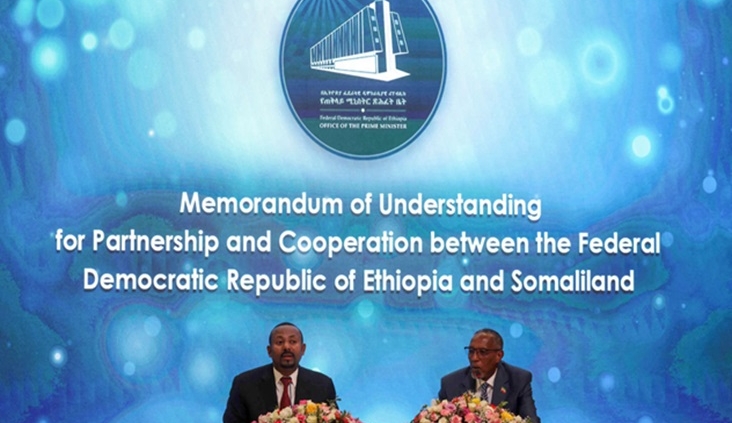Somalia Urges Ethiopia to Cancel Agreement with Somaliland
Somalia has objected to a recent agreement that grants Ethiopia access to a portion of Somaliland’s coastline, a development that enhances Somaliland’s aspirations for statehood.
Ethiopia initiated negotiations on January 1 to officially recognize Somaliland, offering a 50-year lease for a 20km area near Berbera’s Gulf of Aden port in exchange.
The agreement, signed by Ethiopian Prime Minister Abiy Ahmed and Somaliland President Muse Bihi Abdi, has heightened tensions in the strategically significant Horn of Africa region, connecting the Middle East and Africa.
Somalia’s Information Minister, Daud Aweis, warned in a Financial Times interview that Ethiopia’s potential recognition of Somaliland could destabilize the continent, where many nations face separatist challenges.
READ ALSO: Geopolitics Of Ethiopia’s Port Deal
Despite declaring independence in 1991, Somaliland operates as a quasi-independent state with its own government and relative stability, yet it remains unrecognized internationally.
Somalia deems the Ethiopia-Somaliland agreement an act of aggression, vowing to safeguard national sovereignty. President Hassan Sheikh Mohamud affirmed Somalia’s commitment to protecting its territorial integrity.
Though non-binding, the Ethiopia-Somaliland agreement has caused concern among the US, African Union, and IGAD, with fears of exacerbating regional tensions already plagued by conflict and humanitarian crises.
The Horn of Africa, bordering the critical Red Sea maritime corridor, is a geopolitically vital area, underscored by recent attacks on commercial ships by Yemen’s Houthi rebels.
Analysts suggest that the Berbera port deal could be advantageous for Ethiopia, which seeks sea access following its landlocked status after Eritrea’s 1991 separation.
Ethiopia’s reliance on Djibouti’s port and the potential coastal access through the Berbera port deal might enhance its position in regional geopolitical dynamics, especially against Egypt in their Blue Nile dam dispute.
READ ALSO: Turkey May Intervene if Ethiopia-Somaliland Dispute Escalates
For Somaliland, the agreement with Ethiopia reignites discussions on statehood recognition, an ongoing effort marked by diplomatic endeavors and attracting foreign consulates to its capital, Hargeisa.
The Ethiopia-Somaliland deal presents challenges for both Ethiopia and Somalia, with risks of escalating tensions in a region already burdened by the al-Shabaab insurgency. The deal has faced internal opposition in Somaliland, including the reported resignation of its defense minister in protest.
Ethiopia may require funding for the development of a new port and navy, with potential support from the United Arab Emirates, which maintains strong ties with both Ethiopia and Somalia.
The UAE’s growing presence in the Horn of Africa, including involvement in Berbera port and regional conflicts, reflects its expanding influence in the area.







 Reuters
Reuters

 Wikipedia
Wikipedia Top10VPN
Top10VPN
Leave a Reply
Want to join the discussion?Feel free to contribute!